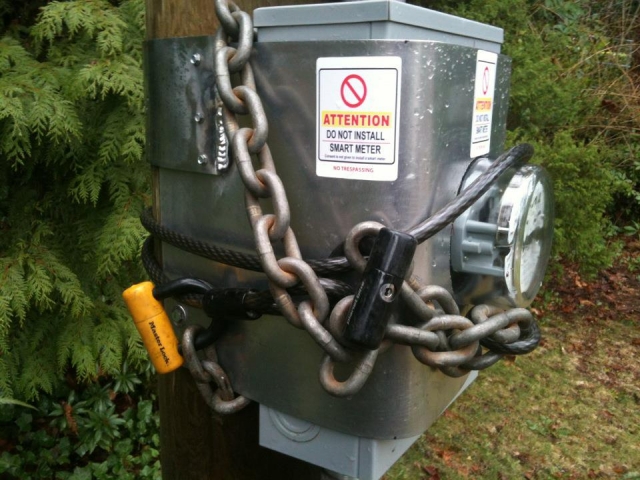BC Utilities Commission Hearings: Smart Meters, Safe or Harmful?
By Suzy Hamilton, The Nelson Daily
The world’s leading health officials do not agree on whether Smart Meters are good or bad for your health.
That was a dominant theme among interveners at a two week BC Utilities Commission hearing March 4-15 into Fortis BC’s application to install 115,000 Smart Meters in their coverage area.
Nine interveners, including RDCK Area D director Andy Shadrack, Southern Interior MP Alex Atameneko and Nelson lawyer David Aaron, representing Citizens for Safe Technology, appeared before the commission to present evidence on the health and safety of Advanced Metering Infrastructure (AMI) — also known as Smart Meters.
“My overall take is that Fortis has not made a case that there is uniform agreement among world leaders about the dangers of wireless technology,” said Shadrack at the end of the hearings.
After presenting his evidence that low level electromagnetic energy may affect hypersensitive people, Shadrack is calling for, at the very least, an opt out plan allowing consumers to refuse wireless Smart Meters.
“My concern is this,” Shadrack told the BCUC panel. “I said at the beginning of this cross-exam I was concerned about people with hypersensitivities. I’m concerned about people who have health concerns around the deployment of these meters.”
He was referring to the research of Swedish oncologist Dr. Lennert Hardell who has linked certain cancers to cell phone use.
Opponents of Smart Meters say the cumulative effects of low-level radiation can increase damage to the nervous system, cause electro-sensitivity, and have adverse reproductive effects and a variety of other effects on different organ systems.
“The question then is, at what level of exposure to something that is known to have an adverse effect do we allow exposures?” Shadrack asked of Fortis expert witness Dr. William Bailey.
Bailey disagreed that the radiation from Smart Meters was harmful:
“The evidence — it’s not that there’s no research or nothing — there’s no evidence at all; that the evidence does not persuade that there is a cause and effect relationship,” replied Dr. Bailey, according to transcripts of the hearings.
Bailey, who is a Ph. D neuropsychologist in the United States, was on one of two witness panels provided by FortisBC. Dr. Baily’s CV lists numerous publications and research on electromagnetic radiation
He is currently a principal scientist at Exponent Health Sciences in Maryland specializing in environmental and occupational health issues.
Other witnesses provided by Fortis for cross-examination were engineers and customer relations personnel.
FortisBC’s’ coverage area spans roughly from the Okanagan Valley to Princeton, east to Creston, including the Slocan Valley, Kaslo and Argenta.
The hearings were designed to give government, organizations and individuals a chance to bring forward their concerns to the Utilities Commission through submissions and cross-examination of Fortis’ experts.
It is the first hearing into the risks of Smart Meters since the provincial government waived the requirement to hold hearings for BC Hydro’s Smart Meter program. BC Hydro has installed nearly two million meters around the province, and Smart Meter installations are nearly complete.
Shadrack also told the BCUC he was concerned about the consumer’s right to choice: Whether consumers have a choice to deny a product they feel is harmful to their health.
In their application, Fortis said opting out was not an option.
“We will see the most economic benefits in the project from not having an opt out. This provides savings for the customers,” said Fortis communications officer Neal Pobran.
Pobran also said that customers could have the wireless meters installed on any part of their property if they do not want them attached to their homes.
Another issue that emerged was Fortis’ policy to disconnect power if a consumer refused a Smart Meter.
“We take a disconnect seriously,” countered Pobran. “We hope to work with customers for a matter of time.” Pobran said the company has a six month deadline but extenuating circumstances such as cold weather or medical devices could affect a disconnect.
The question of health and safety issues from exposure to Smart Meters emerged at the 2011 Union of BC Municipalities when it called for a moratorium “on the mandatory installation of wireless Smart Metres until the major issues and problems identified regarding wireless smart metres are independently assessed and acceptable alternatives can be made available at no added cost to the consumer.”
Subsequent motions have been passed at the RDCK table calling for a right of refusal or an opt out to the Smart Meter program.
Final submissions to the BCUC are due from Fortis by March 28 and by the interveners by April 18, with Fortis’ reply due by April 25. The BCUC has no timeline by which to deliver their decision that can be appealed.
Commented Pobran:
“I thought it was a good example of a process working. There were lots of people in the room and more watching from another location . . .. We’re hoping for a decision by July.”
To read transcripts of the entire hearing go to www.bcuc.comand follow links to current applications, FortisBC, or www.citizensforsafetechnology.org


























Comments